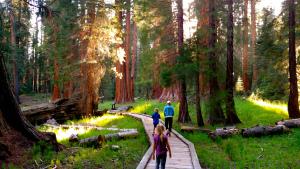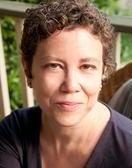
Callaway Kleiner family photo.
Today, we feature an essay from interfaith parent Erika Callaway Kleiner, MDiv. One persistent myth is that interfaith parents raising children with interfaith education must lack religious education or depth. Erika is someone with a rigorous religious education, who has thought long and hard about theology, and still chose (with her Jewish husband) to raise her children with both family religions. In this post, she explains how she got there.
Being a Christian has always been an important part of who I am. I grew up in a small United Methodist Church outside of Oklahoma City. The people there were our church family. I have many fond memories of Sunday School, youth group sleepovers, family camp, and Holy Week. Even in a very conservative area of the country where I did not see many women in religious leadership roles, I was encouraged by two male pastors to be a leader in my church. I served many Sundays as liturgist, sitting next to the altar across from the minister.
In college I decided to major in religion. My professors gently encouraged me to explore my religious beliefs. I remember one professor continually referring to God without using masculine (or feminine) pronouns. The idea that God is bigger than masculine (or feminine) had a motivating and inspiring impact.
Then, when I was a junior in college and my brother a sophomore in high school, my mom died of ovarian cancer. She was our best friend and a beautiful woman of faith. Many people took care of us and supported us. Everyone meant well. But a few people (not part of our church family) said some things I will never forget. “Trust that this is all part of God’s plan.” “It’s such a shame – your Mom was such a good person but she just couldn’t let go of her sin in order to heal.” Statements like these hurt and made me angry. What kind of God chooses to take a mother away from her children? Couldn’t let go of her sin?? She was always a generous, kind and loving person – a testament from everyone who knew her. My reaction was not to shun God or religion, however. I wanted to get to know God better and find a way out of this harmful, debilitating theology.
So I went to Vanderbilt Divinity School and earned a Master of Divinity degree. There I met others struggling with questions of theodicy: Where is God in our suffering? What is our role as humans to ameliorate suffering and bring about justice? In divinity school, I had the space to live in these questions and gain some answers for myself (along with many more questions). I graduated with a different and deeper faith and also the realization that I wanted to join in the work towards creating social justice.
For me, God was not only bigger than masculine or feminine, God was also bigger than my Christian religion. Meanwhile, I was falling in love with a friend who eventually became my husband. He is Jewish. Neither of us intended to partner outside our religions. Still, what we discovered as we talked about how we were raised and what we believed is that we both wanted to help create a kinder and more compassionate world where people appreciate and respect diversity.
A rabbi and a minister married us on the Vanderbilt campus with our families and friends celebrating with us. We were intentional about every element of our ceremony, and we have been intentional about all the religious decisions we have made since then. In 2008, after attending several churches and belonging to a Reconstructionist synagogue, we decided to join the Interfaith Families Project of Greater Washington (IFFP). We realized that this was a place where people truly understood our choices and situation.
Early on, we worried about how our children would identify. Is this confusing? Will they ultimately not feel included in either Judaism or Christianity? Will they have a spiritual home? Our children are still young — eight and six — so the answers to these questions remain to be seen. What we do see each week as we leave the Gathering at IFFP and Sunday School is our kids confidently living an interfaith life. They sing songs in Hebrew and also This Little Light of Mine. They are learning the similarities and connections between Judaism and Christianity as well as the differences and what this means for their lives. And they are already asking and finding their own answers to significant theological questions. It is a beautiful thing to behold.
I have grown fond of the rhythm the practice of Judaism creates in my own life and that of my family. The ritual of Shabbat is a welcome part of my week. I look forward to the deep and cleansing time of the High Holy Days just as I look forward to the season of Advent.
The rituals and the theologies of both traditions now inform and inspire my thinking about the world and my place in it. I appreciate aspects of Judaism that encourage us to wrestle with theology and continue asking questions. In addition, from Jesus I hear the two greatest commandments reiterated. Love God with all your heart, mind and soul, and love your neighbor as yourself.
The other day my kids asked me in the car if I see myself as Interfaith. I responded in a very Jewish way – with a question! I asked, “How do you see me?” They said, “Yes, Mom, you’re both!”
Susan Katz Miller’s book, Being Both: Embracing Two Religions in One Interfaith Family is available now in hardcover, paperback and eBook from Beacon Press.

